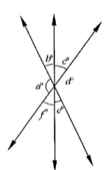If x and y are negative , then which of the following statements is / are always true? x + y is positive. II xy is positive. III. x y is positive. I only (b) II only (c) III only (d) I and III only
Step by step video & image solution for If x\ a n d\ y are negative , then which of the following statements is / are always true? x\ +\ y is positive. II x y is positive. III. x\ \ y is positive. I only (b) II only (c) III only (d) I and III only by Maths experts to help you in doubts & scoring excellent marks in Class 14 exams.
Topper's Solved these Questions
Similar Questions
If x and y are negative , then which of the following statements is / are always true? x + y is positive. II xy is positive. III. x y is positive. I only (b) II only (c) III only (d) I and III only
View SolutionIf x−y=8 , then which of the following must be true? Both x and y are positive. II. If x is negative, y must be positive III. If x is negative, y must be negative. (a) I only (b) II only (c) I and II (d) III only
View Solution
Knowledge Check
- Question 1 - Select One
If e(x,y) is negative, then which of the following is positive?
AbxyBbyxCCov(x,y)DNone of these - Question 2 - Select One
x, y and z are the natural numbers. Which of the following statements is true?
I. If x is divisible by y and y is divisible by z then x must be divisible by z.
II. If x is a factor of y and z, then x must be a factor of y + z.
III. If x is a factor of y and z, then x must be a factor of yz.AI, II and IIIBI onlyCI and IIDII only
For the integer n , if n3 is odd, then which of the following statements are true? n is odd. II. n2 is odd. III. n2 is even (a) I only (b) II only (c) I and II only (d) I and III only
View SolutionIf n=1+x , where x is the product of four consecutive positive integers, then which of the following is/are true? n is odd II. n is prime III. n is a perfect square. (a) I only (b) I and II only (c) I and III only (d) None of these
View SolutionGiven n=1+xandx is product of four consecutive integers. Then which of the following is true? I n is an odd integer II. n is prime. III. n is a perfect square. Only I is correct (b) Only III is correct (c) Both I and II are correct (d) Both I and III are correct
View SolutionThe sum of three consecutive odd numbers is always divisible by I. 2 II. 3 III. 5 IV. 6 Only I (b) Only II (c) Only I and II (d) Only I and III
View SolutionIn Figure, which of the following statements must be true? (i) a+b=d+c (ii) a+c+e=1800 (iii) b+f=c+e (a) (i) only (b) (ii) only (c) (iii) only (d) (ii) and (iii) only
 View Solution
View SolutionWhich of the following conditions imply that the real number x is rational ? I x12 is rational II x2andx5 are rational III x2andx4 are rational II x2 and x3 are rational (A) Jand I only (B) I and IIl only (C) Il and II only (D) I, Il and II (A) Jánd II only (B) I and III only
View Solution

